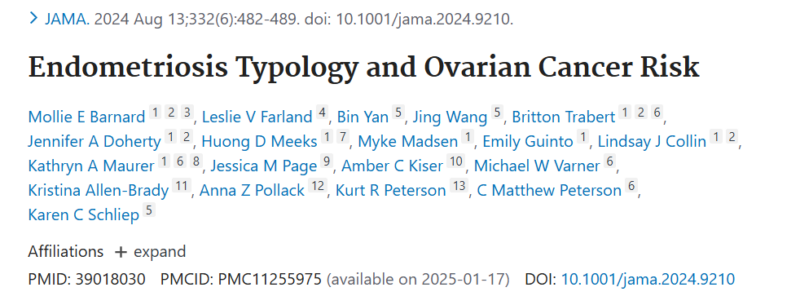Endometriosis is a condition where tissue similar to the uterine lining grows outside the uterus, often on the ovaries, fallopian tubes, and pelvic cavity. This tissue thickens, breaks down, and bleeds with each menstrual cycle, leading to irritation, scar tissue, and adhesions. Common symptoms include pelvic pain, infertility, pain during intercourse, and heavy menstrual bleeding, though some may experience no symptoms.
There are three main types of endometriosis:
- Superficial endometriosis – Affects the pelvic cavity membranes, often without symptoms.
- Deep infiltrating endometriosis – Penetrates deeper into organs like ovaries, bladder, and bowels, causing severe pain.
- Endometriomas – Cysts that form in the ovaries, causing pain and potential fertility issues.
About the Study
A recent study titled “Endometriosis Typology and Ovarian Cancer Risk” published on JAMA led by Dr. Karen Schliep at the University of Utah explored the relationship between endometriosis subtypes and the risk of ovarian cancer. The study used data from the Utah Population Database, which links health records from over 11 million individuals. The researchers examined the electronic health records of more than 78,000 women with endometriosis, aged 18 to 55, and compared them with nearly 380,000 women without the condition. The study tracked cancer diagnoses through cancer registry records, revealing that nearly 600 women from the two groups developed ovarian cancer.
Authors: Mollie E Barnard, Leslie V Farland, Bin Yan, Jing Wang, Britton Trabert, Jennifer A Doherty, Huong D Meeks, Myke Madsen, Emily Guinto, Lindsay J Collin, Kathryn A Maurer, Jessica M Page, Amber C Kiser, Michael W Varner, Kristina Allen-Brady, Anna Z Pollack, Kurt R Peterson, C Matthew Peterson, Karen C Schliep

The study found that women with endometriosis had more than four times the risk of developing ovarian cancer compared to women without the condition, with about 10 additional cases of ovarian cancer per 10,000 women. The risk of developing ovarian cancer was highest among women with severe forms of endometriosis, specifically deep infiltrating endometriosis and ovarian endometriomas. These women had a risk more than nine times greater than women without endometriosis. The researchers noted that the increased cancer risk was mainly associated with type I ovarian cancer, a form of cancer that typically grows slowly and causes fewer symptoms than the more aggressive type II cancer.
Dr. Schliep highlighted the significance of these findings, stating that the data provides valuable information for women considering treatment options for endometriosis. This knowledge can help them make informed, shared decisions with their healthcare providers regarding potential risks of developing ovarian cancer. While the study provides important insights, Dr. Schliep emphasized the need for further research to fully understand how different subtypes of endometriosis contribute to the development of various types of ovarian cancer. This additional research could potentially lead to new approaches in preventing and treating these cancers.
Ovarian cancer
Ovarian cancer is a type of cancer that originates in the ovaries, although it can also develop in surrounding structures such as the fallopian tubes or the abdominal lining. It is often diagnosed at later stages due to vague early symptoms. As the cancer progresses, symptoms such as bloating, pelvic pain, abdominal swelling, and loss of appetite become more noticeable. The cancer may spread to other parts of the body, including the abdomen, lymph nodes, lungs, and liver. Risk factors include age, hormone therapy after menopause, fertility medications, obesity, and a history of ovulation. Genetic factors, such as mutations in the BRCA1 and BRCA2 genes, can also increase the risk.

There are several types of ovarian cancer, with epithelial ovarian carcinoma being the most common, accounting for more than 95% of cases. High-grade serous carcinoma (HGSC) is the most frequent subtype. Other types include germ cell tumors and sex cord-stromal tumors. Diagnosis is typically confirmed through a biopsy, usually performed during surgery. Treatment often includes a combination of surgery, chemotherapy, and sometimes radiation therapy. Early-stage ovarian cancer can be curable, but outcomes depend on the extent of the disease, the cancer subtype, and the patient’s overall health.
While ovarian cancer is the second most common gynecologic cancer globally, it causes more deaths than any other cancer of the female reproductive system. In 2020, there were approximately 313,000 new cases worldwide, with 13,445 deaths in the U.S. alone. The disease is most common in women over 60 and is more prevalent in developed countries. Screening is not recommended for those at average risk due to the high rate of false positives and lack of evidence supporting improved survival. For women at high risk, preventive measures such as ovary removal may be considered.
About Karen Schliep
Dr. Karen Schliep, PhD, MSPH, is an Associate Professor in the Division of Public Health at the University of Utah. She completed her undergraduate degrees in English from Carleton College and Biology from the University of Utah. Dr. Schliep earned her MSPH and PhD in Public Health from the University of Utah and later completed pre-doctoral and post-doctoral fellowships at the Eunice Kennedy Shriver National Institute of Child Health and Human Development (NICHD) in the Epidemiology Branch.

Dr. Schliep’s research primarily focuses on understanding the impact of modifiable factors, such as lifestyle, psychosocial elements, and pharmacotherapy, on female endocrinology and reproductive health. She is particularly interested in the short- and long-term consequences of gynecologic disorders and pregnancy complications. Her work aims to identify strategies for improving health outcomes for women, particularly through tailored interventions that can benefit not only women’s health but also the well-being of future generations.
Through her research, Dr. Schliep seeks to inform interventions that can address reproductive health challenges, enhance women’s well-being, and provide economic benefits. Her goal is to help create personalized approaches that support women’s health throughout their lives, ultimately promoting healthier outcomes for families and communities.
The National Institutes of Health (NIH)
The National Institutes of Health (NIH) is the leading agency of the U.S. government responsible for conducting and funding biomedical and public health research. Established in 1887, it operates under the Department of Health and Human Services. NIH’s headquarters are located in Bethesda, Maryland, with additional facilities in Research Triangle Park (North Carolina) and other locations across the U.S. The NIH is known for its significant contributions to scientific advancements, funding groundbreaking medical research, and its ongoing work to improve public health.

The NIH’s Intramural Research Program (IRP) conducts cutting-edge scientific research internally, employing over 1,200 principal investigators and 4,000 postdoctoral fellows. As the world’s largest biomedical research institution, the NIH makes significant strides in basic, translational, and clinical research. In addition, the Extramural Research Program provides substantial funding to academic institutions, hospitals, and research organizations outside of NIH. In 2003, the extramural program contributed approximately $26.4 billion annually to the U.S. biomedical research sector.
The NIH comprises 27 institutes and centers, each dedicated to specific areas of biomedical science. These institutes have been instrumental in groundbreaking discoveries, such as the development of vaccines for HPV, hepatitis, and HIB, and the discovery of fluoride’s role in preventing tooth decay. The NIH’s reputation for excellence is reflected in its rank as the second-largest contributor to biomedical publications worldwide, according to the Nature Index of 2019. Through its vast research efforts and funding, the NIH continues to be a critical leader in advancing global health and scientific knowledge.
